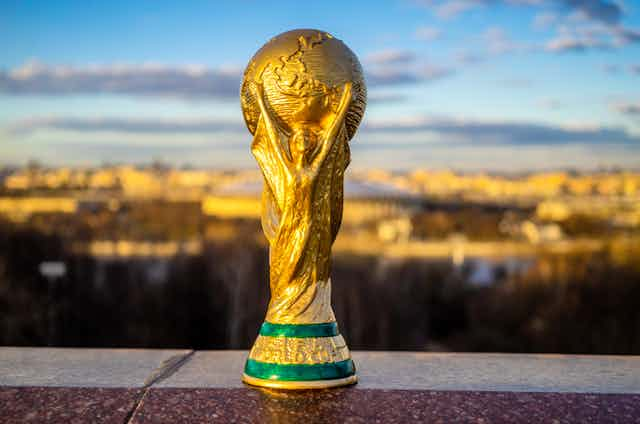There’s more to life than football.
That was the observation of the late Brazilian midfielder Socrates. A medical doctor as well as a great footballer, he was also a champion of social and political activism.
In the midst of Brazil’s military dictatorship in the early 1980s, Socrates led a pioneering movement from his position as a star player at the Corinthians football club. “Democracia Corinthiana” held that everyone at the club – from president to kit man – should have equal voting rights on all club matters.
Walking onto the pitch for the league final in 1983, he and his teammates proudly carried a banner emblazoned with the message for an international audience: “Win or lose, but always with democracy.”
Fast forward 35 years, and before a ball was kicked in Russia this summer, calls for democracy loomed large on the eve of a World Cup already beset by FIFA corruption fatigue, threats of racially intolerant fans, and a crippling overdose of the one thing football is supposed to be immune to: politics.
For now, the drama of the action on the pitch has taken centre stage. But look just a little closer and you will see ominous signs of a football fraternity which has forgotten that with great power (alongside staggering wealth and public adulation) comes great social responsibility.
Sporting heroism
It’s enticing to compare the activism of Socrates with the apparent outlook of one of today’s Brazilian stars. Neymar celebrated his 26th birthday with a celebrity filled black tie party for 200 guests at a plush Paris venue in February and had his name and image projected into the night sky by his club.
To some, Neymar and his £200m price tag might be paraded as evidence of a hollow, commercially driven individualism which has slowly devoured the collective ethos of sport. One could almost adapt Socrtates’s earlier message to: “Win or lose, but always about me.”
Yet playing such a blame game would be a mistake. To romanticise football’s past is to gloss over decades of the game being synonymous with toxic racial intolerance, sexist boardrooms and booze-filled bigotry. Even if Neymar is a fitting caricature of capitalism’s sporting excess, he is merely a product of an era when personalised emojis and private jets take priority over humanitarian crises, inequality and climate change.
Hope in individual role models is not lost however. Step forward Manchester United midfielder Juan Mata, who in August 2017 established the Common Goal initiative. Driven by salary donations from players, clubs, managers and supporters, it aims to redistribute 1% of football’s astronomic wealth to charities across the world. It has already attracted support from high profile international footballers such as Mats Hummels and Giorgio Chiellini.
Acts of courage are evident too. Just ask US international Megan Rapinoe, who in 2016 took a stand – or rather a Colin Kaepernick inspired bended knee – during the national anthem against systemic racial injustice and police brutality.
Or there’s SVB Vitesse and Georgia defender Guram Kashia, whose brave decision to wear a rainbow armband in support of LGBTQ rights shook Georgian society. And don’t forget Robbie Rogers, who threw open the doors of the locker room closet when he proudly took to the field as Major League Soccer’s first openly gay footballer.
Fighting for the future
Off the pitch, recent years have also seen progressive shifts beyond the dark days when the “old boys club” had a firm grip on the game. Earlier this year, the Norwegian Football Federation’s dismantling of gender pay gaps for the men’s and women’s national teams established a new gold standard in the global game.
The ripple effects are already being felt amid gender equity debates in Australia, Brazil and the Middle East, where in 2016 the under-17 Women’s World Cup in Jordan was the first time hijabs were permitted at a major FIFA tournament.
A global expansion of football foundations also bodes well, both as community facing arms of elite clubs – like the Barca Foundation in Spain – and as altruistic ventures on behalf of individual players – Neymar included.
Progressive social agendas have inspired the growth of left leaning clubs like FC St Pauli of Germany, where commercialism is frowned upon and the fanbase is wholly opposed to neo-Nazi uprisings. Timely too have been integrated initiatives such as Amnesty International’s “Football Welcomes” programme in the UK, which has united 60 clubs in support of refugee focused activities including education, social inclusion and community building.
As football fans shift their attention to preparations for the 2022 World Cup in Qatar, one thing is certain. The real battleground lies not on the pitch or in the terraces, but in the shared quest for more inclusive, sustainable and socially just societies the world over.
The time has come to embrace Socrates’s simple game plan. In football, as in life, fight for a future in which winning isn’t all that matters.
More evidence-based articles about football and the World Cup:

